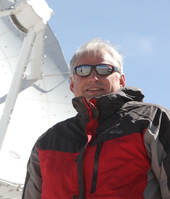Schedule of Activities for AstroBlast 2024
ASTROBLAST 2024 will take place Tuesday, Oct. 1 through Sunday, Oct. 6
REGISTER for ASTROBLAST Today - Click Here and SAVE $$!
Please note: we are still in the process of finalizing an exciting program for attendees in celebration of the 30th Anniversary of ASTROBLAST! This is a tentative high-level outline. Specific times and additional details will be added soon.
Tuesday, October 1
Wednesday, October 2
Thursday, October 3
Friday, October 4
Saturday, October 5
Sunday, October 6
Tuesday, October 1
- ASTROBLAST Begins
- Dark Sky Observing
Wednesday, October 2
- Share-a-thon - Astrophotography Tools, Techniques and Tips (Round-table Discussion)
- Dark Sky Observing
Thursday, October 3
- Photoshop Astrophotography Processing - Dean Salisbury (4-hour Workshop)
- How to Sketch Deep Sky Objects - Larry McHenry (Presentation)
- Dark Sky Observing
Friday, October 4
- PixInsight Astrophotography Processing - Gary Salisbury (4-hour Workshop)
- Share-a-thon – Visual Observing Tools, Techniques and Tips (Round-table Discussion)
- Professional - Amateur Astronomer Research Collaboration – Tim Spuck (Presentation)
- Our Changing Planet: Impacts on Astronomy and our Connections to the Sky – Tiffany Stone Wolbrecht (Presentation)
- Three Stars: Regor, Dnoces and Navi - Dean Miskovich (Presentation)
- Observatory Tours
- Green Laser Constellation Tour - Larry McHenry
- Observing Competition
- Dark Sky Observing
Saturday, October 5
- Kids Astronomy Camp – Miranda Heller (4 hours)
- Astronomy Flea Market
- Nature Walk
- Share-a-thon – Astro Web Resources for a Better Astronomy Experience (Round-table Discussion)
- Stonehenge at the Winter Solstice 2023 – Ed Ting (Presentation)
- The New Universe – Derrick Pitts (Presentation)
- UAP and Information Science: Organizing the ‘X-Files’ for Evidence-Based Research – Gretchen Stahlman (Presentation)
- Share-a-thon – Getting Started in Astronomy (Round-table Discussion)
- Nightscape & Wide Angle Astrophotography - Matt Dieterich (Presentation)
- Pizza Party and Door Prize Drawing
- Observing Competition
- Dark Sky Observing
Sunday, October 6
- ASTROBLAST Officially Ends (1:00 PM)
We have an excellent slate of in-person speakers lined up for ASTROBLAST 2024! Check out their bios below!
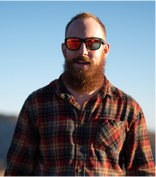
Matt Dieterich is an avid astrophotographer and Program Manager for Sea West Observatories. Their design-build firm specializes in constructing and maintaining observatories for both private and institutional clients. Using telescopes to capture images of the night sky was his entry into astrophotography back in 2007 from the suburbs of Pittsburgh, PA. Over the years, Matt's work has been published by outlets such as National Geographic, PBS, CBS, and the Smithsonian Institution. With the goal of inspiring others to stargaze, Matt continues sharing his passion for astrophotography during workshops and on his social media channels.
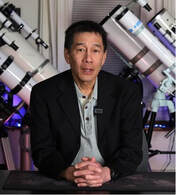
Ed Ting is a well-known amateur astronomer whose works have appeared in Sky & Telescope, Astronomy, Skywatch, Discover, and Popular Mechanics magazines. He is an ACEAP Ambassador to Chile, and a NASA Solar System Ambassador. His science-themed YouTube channel gets two million views a year. In addition to his science writing, Ed’s creative works have appeared in literary journals. He is a past winner of the NH State Flash Fiction contest, and was selected as Writer-in–Residence at the Noepe Center for the Fine Arts in Edgartown, Massachusetts in 2016. Ed holds a BS in Electrical Engineering from the University of Illinois, an MFA from New England College, and an MA from Dartmouth, where he produced an award-winning thesis on astronomical imaging. He is on the editorial board of Clamantis, the literary journal at Dartmouth, and has taught English Composition and Creative Writing at New England College. Ed is a classical/New Age pianist, a retired Category 3 bicycle racer, and an enthusiastic fudge confectioner.
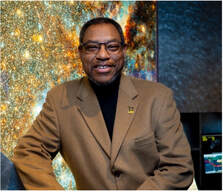
Dr. Derrick Pitts has been associated with The Franklin Institute since 1978, designing and presenting many of the museum’s public programs and exhibits. A NASA Solar System Ambassador since 2010, he also served as NASA’s first ‘Astrobiology Ambassador’ and at the invitation of Space Shuttle astronauts, has flown items of his own creation on five different flights. Pitts appears regularly as a science content expert for most national and international media outlets including PBS NOVA, BBC, Discovery Channel, Science Channel, History Channel, and Curiosity Stream. He’s also been the “Astro Guy” for two NPR radio stations in Philadelphia for nearly 40 years. He’s created outreach content for major observatories around the world and has NASA-funded astronomy education programs operating through science museums and community centers from Alaska to Louisiana to Maine, connecting thousands of families to NASA’s vast array of online resources. In 1999, he was the lead astronomer for a Cunard Cruise Lines tour of the Black Sea region - which included a total solar eclipse! In 2010, he was the US Spokesperson for the International Astronomical Union’s International Year of Astronomy and he is an alum of the 2016 Astronomy in Chile Education Ambassador Program (ACEAP). He has received numerous awards including honorary degrees from LaSalle University, Rowan University and Wagner Free Institute. Pitts serves as a Board member for his alma mater St. Lawrence University, the Astronomical Society of the Pacific and Associated Universities, Inc. His ‘X’ (formerly Twitter) handle is @CoolAstronomer and his motto is ‘Eat, breathe, do science. Sleep later.’
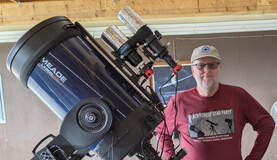
Larry McHenry has been active in amateur astronomy for over 40 years, and is a member of the Kiski Astronomers, and the Oil Region Astronomical Society (ORAS) in Western Pennsylvania. While Larry is currently an EAA observer, one of his favorite past astronomical activities is sketching deep-sky objects and he still occasionally picks up pencil & paper. Over the years, Larry has sketched and EAA/video-astronomy observed all of the Messier Objects. You can view Larry's personal sketching observations and can learn more about Larry's astronomical interests online at his webportal: http://www.stellar-journeys.org
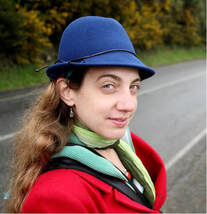
Dr. Gretchen Stahlman is an Assistant Professor in the School of Information at Florida State University. She previously served as Assistant Professor of Library & Information Science at Rutgers University. She currently serves on the ASTRO ACCEL Leadership Team and is co-leading an effort to explore how we communicate with the general public about UAP (UFO). Gretchen earned her Ph.D. degree from the University of Arizona School of Information in 2020. Her current research interests broadly include scholarly and science communication, scientific information lifecycles, and the sociotechnical systems supporting research infrastructures, resources, and data management. The overall purpose of Gretchen’s present and future work is to inform open science and scholarly communication initiatives, as well as development of methods, services, and infrastructures for long-term information management and responsible data science. With more than 10 years of prior professional experience related to librarianship and information management, she has also worked in an academic library, and as a documentation specialist for the Atacama Large Millimeter/submillimeter Array (ALMA) telescope construction project.
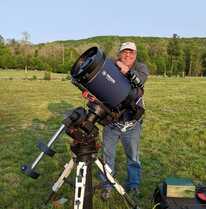
Dean Miskovich is president of the Oil Regional Astronomical Society and has been an avid amateur astronomer for over 55 years. He is learning astrophotography but will always enjoy putting an eyepiece in a telescope and just going star hopping. He is a retired airline captain and lately enjoys spending time with his family, including two grandchildren, and his telescope, in that order.
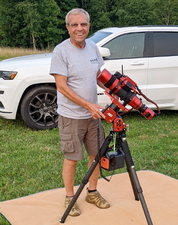
Dean Salisbury is the current ORAS Vice President. He has been passionate about photography since his father gave him his old Argus C3 in 1964. He still has that camera and it continues to work just fine. Photographing subjects “not made by man” is his main interest. First birds, then experimenting with night scape imaging. The surprise appearance of a meteor in one of his images got him hooked on astrophotography. He enjoys learning from fellow enthusiasts and loves sharing his own experiences with others.
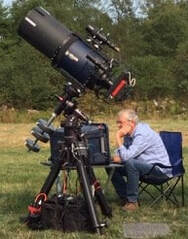
Gary Salisbury is a native of Butler, PA. He attended the University of Pittsburgh and received his PhD in Electrical Engineering from George Washington University in Washington DC. He retired from the Air Force in the field of Information Technology and Cyber security. He completed a second career with a large Federal Defense Contractor and started two small consulting businesses. He currently mentors small business entrepreneurs in the Maryland, Virginia and Wash DC area. He began his astrophotography journey in 2015 with the acquisition of a friend’s Meade telescope and a borrowed Nikon camera. He continues to learn and improve his imaging and processing techniques.
